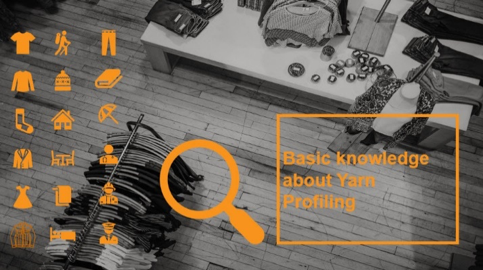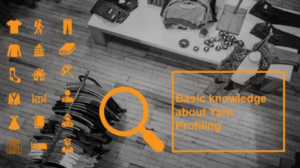
Content
The training series focuses on textiles and their needs. The course teaches how the textile properties of clothings or home textiles are influenced by the yarn properties. Determining the ideal yarn for a textile application – the “Yarn Profiling”. In addition to the general part of profiling, the series is supplemented by various case studies on specific textile applications. Concrete examples such as yarn profiles for T-shirts, socks, shirts, sweatshirts, terry towels and more. The selection of the textile applications is not based on quantity or meaning, but on variety and difference. A derivation to other textiles is therefore possible. An overview is given of how the specific textile is manufactured – construction and manufacturing process. Statistical market facts about the specific textile enrich the information content. Facts such as distribution of yarn number, raw material, yarn types. Specific requirements for the garment are “translated” into yarn properties.
With this training you are able to order a yarn exactly according to the requirements of the application competently or as a spinning mill to advise your customers competently in the sales process. The series is suitable for yarn developers, quality managers and the spinning mill salesman. Product developers and yarn buyers of the weaving and knitting mills receive the necessary support. Easier communication with brands and your trading partners.
Depending on the speed and learning method of the trainee, between 45 – 60 minutes are required for an eLearning part. Each training course contains questions that allow the trainee to check immediately how well he or she has understood the contents. The student automatically concentrates again on the most important contents through the questions.

Parts:
Part 1: You will learn what “Yarn Profiling” means and what the process looks like. You will receive the hand tool to determine “Yarn Profiling” yourself. Enriched with overviews of fibre properties and their influence on fabric properties. Textile applications and their needs, yarn properties and their influence on fabric properties. You will learn how Uster Statistics can be useful in profiling and what an optimization loop means.
Part 2 deals with the textile applications “Single Jersey T-Shirt” and “Sweatshirt”. You will learn facts and figures about the application market. How they are designed and manufactured and what specific textile needs they have. You will receive a “translation” of the requirements into yarn properties. A proposal for a yarn profile with concrete yarn values is listed and explained.
Part 3 deals with the textile applications “Polo Pike Shirt” and “Socks”. You will learn facts and figures of the application market. How they are designed and manufactured and what specific textile needs they have. You get a “translation” of the needs into yarn properties. A proposal of a yarn profile with concrete yarn values is listed and explained.
Further textile applications are gradually added to the series.
It is recommended to complete the 1st part at the beginning. The other parts are independent of each other.
Technical requirements to complete an eLearning course:
- Microsoft Internet Explorer 11 or higher.
- Microsoft Edge 39.14942 (EdgeHTML 15) or higher.
- Mozilla Firefox 10 or higher.
- Google Chrome 16 or higher.
- Safari: always the latest version (in case of problems please make sure that you have done the last software update on your Apple device).
All eLearnings are created with responsive design and can be viewed on all screen sizes. However, you will have optimal readability and comfort if your screen size is at least 7.9″ (20 cm diagonal).
If you have further questions regarding the training process, please contact us. We will be happy to provide further information.
Trainings in this serie:
-
 Yarn Profiling/ Part 1CHF50.00
Yarn Profiling/ Part 1CHF50.00 -
 Yarn Profiling/ Part 2CHF50.00
Yarn Profiling/ Part 2CHF50.00 -
 Yarn Profiling/ Part 3CHF50.00
Yarn Profiling/ Part 3CHF50.00